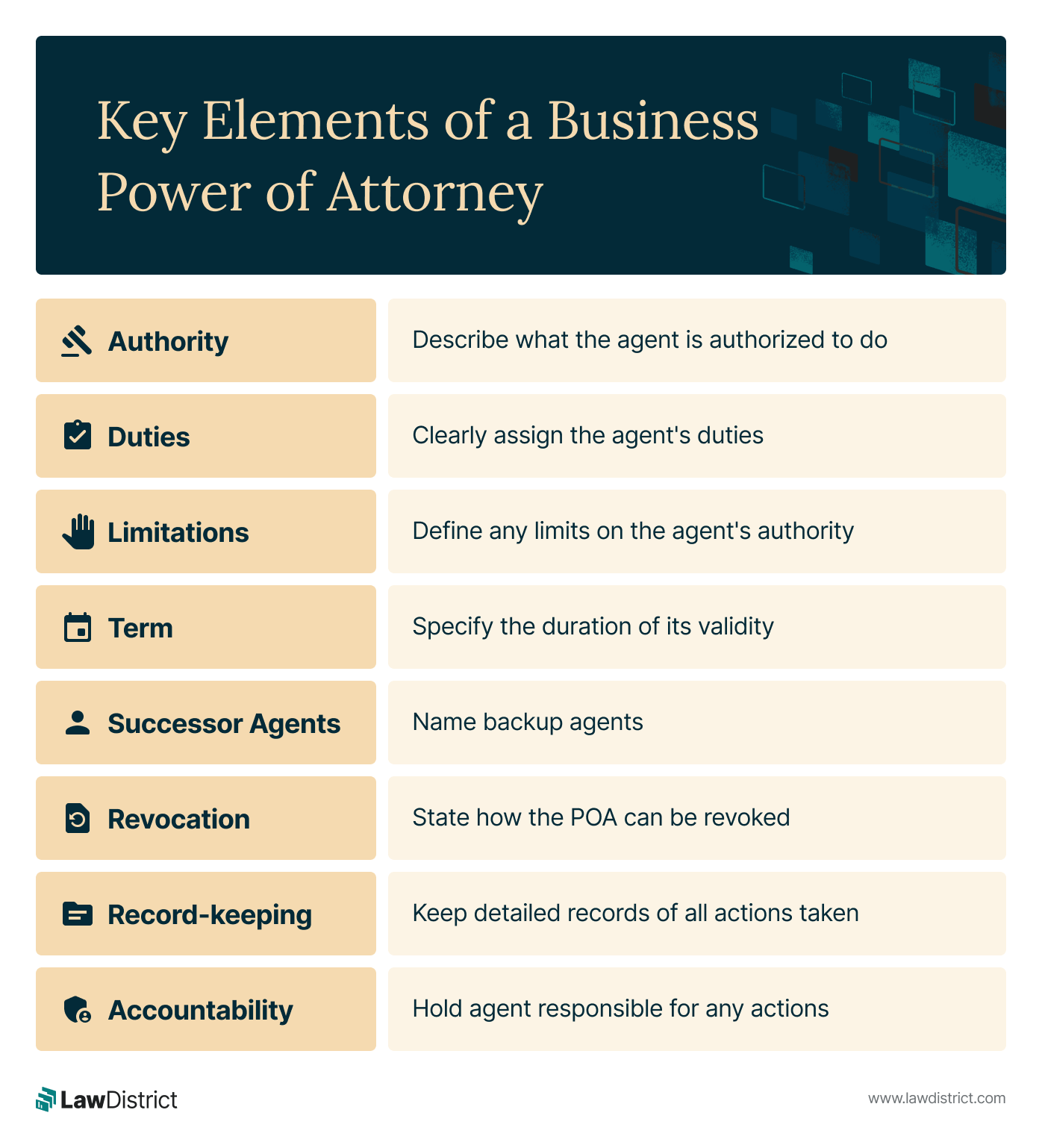As a business owner, you have a lot on your plate, from managing finances to making important decisions that affect your company's future. What happens if you are incapacitated or ill and can no longer make those decisions? Interestingly, over 50% of business owners lack a business succession plan.
This means that most small business owners may leave their businesses vulnerable to legal and financial challenges in the event of incapacity or death. This is why a Business Power of Attorney (BPOA) is necessary.
If you cannot decide for yourself, a BPOA allows a trusted individual, such as a project manager, long-term employee, family member, friend, or attorney, to act on your behalf, like a normal power of attorney. The decisions can relate to finances, operations, contracts, etc.
By taking steps to protect your business and ensuring that your interests are always protected, you can put yourself in a strong position to succeed.
What Is a Power of Attorney for a Business?
A Business Power of Attorney (BPOA) is a legal document that allows individuals or entities to act on behalf of businesses. An individual or entity designated as the agent in the POA is authorized to make business-related decisions and take action.
These decisions can include signing contracts, making financial decisions, and entering into legally binding agreements, so it is crucial that you choose the right person to hold your BPOA. In addition, IRS form 2848 lets you designate someone else (such as an accountant) to file federal taxes on your behalf.
State laws governing BPOAs differ in the United States. Many states, however, have adopted the Uniform Power of Attorney Act (UPOAA). This act outlines the process of creating and using BPOAs and specifies the requirements for a valid BPOA, including the condition that the principal (the business owner) sign and two witnesses witness the document.
If you are creating a BPOA, consult an attorney to ensure it meets your state's unique needs and concerns. A BPOA will protect your business assets and ensure that the business is protected even if you are away from the company.
Why is a Business Power of Attorney Important?
A Business Power of Attorney (BPOA) is essential for any business owner because it helps protect you in various situations, including sickness, incapacity, and death. BPOAs are essential for several reasons:
- Incapacity or illness: In case of a lack of mental capacity or illness, a BPOA can grant authority to someone to act on the owner's behalf. Without a BPOA, key decisions may not be implemented promptly, leaving the business in limbo.
- Maintain owner’s wishes: A BPOA can help ensure that key decisions are made with the owner's wishes in mind. It may help prevent disputes between family members or business partners over the direction of the business, which can be time-consuming and costly to resolve.
- Continuity of business operations: By authorizing someone to make business decisions and sign documents in the absence of the owner, a BPOA can ensure the continuity of business operations. Small businesses benefit more since owners are heavily involved in day-to-day operations.
- Protection of business assets: A BPOA authorizes someone to make financial decisions on the business’s behalf, which protects the company's assets. This can be helpful when an owner cannot manage the business's finances due to illness or incapacity.
Nearly 60% of Americans lack a will, estate plan, or business succession plan, according to the American Association of Retired Persons (AARP). The incapacity or death of an owner can expose businesses to legal and financial challenges.
BPOA laws vary from state to state, but the Uniform Power of Attorney Act (UPOAA) has been adopted by most states as a model law. It stipulates guidelines for creating a valid BPOA and provides for its termination. Agents are also protected from abuse of power under this law.
Note: Consult with a lawyer before executing your BPOA, as it is crucial to ensure it is valid and enforceable in your state.
What Happens When There's No Business POA
Legal and financial challenges can arise without Business Power of Attorney (BPOA). A BPOA protects the business from disputes over decision-making authority or from being unable to enter into contracts or loans without one.
Without a BPOA, the court may appoint a guardian or conservator to manage the owner's business affairs. The process can be time-consuming and costly and may not yield the owner's preferred outcome. Disputes can also arise within families or between stakeholders.
State laws govern powers of attorney, including BPOAs, under the Uniform Power of Attorney Act (UPOAA). As part of these laws, BPOAs must comply with witness and notarization requirements and provisions protecting the agent from abuse of power.
A BPOA protects your business from legal and financial challenges and ensures smooth operation.
Key Considerations When Writing a Business Power of Attorney
If you are writing a business power of attorney, you need to be aware of the duties and limitations you will assign to the agent. Considerations include:
- Authority: Defining the agent's authority is crucial. A power of attorney should clearly describe what the agent is authorized to do for the business. Moreover, it should specify what actions need prior approval from the board or business owner.
- Duties: A power of attorney should clearly define the agent's duties. Financial management, business decisions, contract negotiation, and legal representation may be included in this role.
- Limitations: A power of attorney should also specify any limits on the agent's authority. For instance, the agent's ability to engage in certain transactions or make certain decisions may be restricted.
- Term: A power of attorney must specify the duration of its validity. Depending on the business owner, this may be for a specific period or until it is revoked.
- Successor agents: When the original agent cannot represent the business, successor agents should be appointed.
- Revocation: If a power of attorney is revoked, it should specify how it can be done, perhaps by the business owner.
- Record-keeping: Agents should keep detailed records of all actions taken on behalf of businesses and provide regular reports to owners and directors.
- Accountability: Agents must be held responsible for any actions they take on behalf of their clients. For example, certain transactions may require prior approval, or regular financial reports may need to be provided

Investing time and effort in creating a business power of attorney is wise. The right legal strategy can help you avoid costly legal battles and prepare your business for unexpected challenges.
If you are looking for more information for your POA needs, check out our other guides:
Helpful Resources:
Form 2848, Power of Attorney and Declaration of Representative | Internal Revenue Service
Power of Attorney | American Bar
Survey: 60% of Americans lack will or estate planning | AARP



